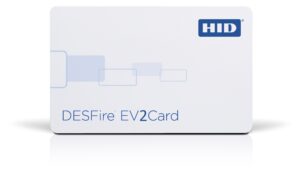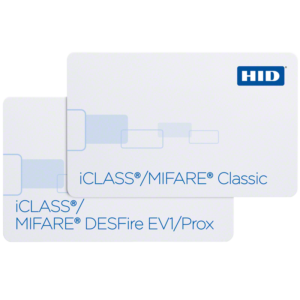Sort by
DESFire Access Cards
Unicard are a leading provider of access cards from all technologies.
Unicard are a leading provider of Access Cards in Australia and can supply formatted access cards for all technologies.
As a HID Platinum Partner, Unicard have access to the best pricing across the large HID card range and continue to provide to many security installers around Australia. DESFire cards can be supplied in all versions – EV1, EV2 and EV3. These are supplied in all chip sizes 2k, 4k, 8k, 16k and more.
Unicard can encode access details (site code and card number) to the sector/page of your choice, or they can be supplied blank to be used with the default transport CSN.DESFire is also available in key fobs, dots, tags and labels.
Contact Unicard today to discuss your current access cards or order the Mifare DESfire card range online to receive fast Australia wide delivery.
Unicard are the Access Card experts!
Experts in Access Card Technologies
Unicard have been assisting the Australian market for decades and continue to provide trusted guidance to our customers for all their access needs.
Contact Unicard today for a quick and easy call to discuss ordering access cards, fobs, tags and more.
Encoded and numbered access cards
Unicard supply hundreds of thousands of access cards per year to our customers. Our customers most commonly order these cards pre-encoded and numbered so that when they arrive, they are ready to be used immediately.
Unicard encode many formats on site and are ready to assist you with faster production and the best pricing on high quality durable card stock.
Multiple technologies and formats available
Unicard supply all the most common access card technologies which operate on both 125khz and 13.56mhz frequency. These access cards are then encoded with 26bit or many other common formats to work with the access control system on site.
Unicard supply many different card formats around Australia. Speak to our team today about your custom requirements and Unicard can help sourcing more stock or provide guidance for new / upgrading sites.
Enquire with Unicard about your DESFire access card requirements today
Contact our friendly and helpful team today to discuss your access control system requirements. Unicard can assist you in answering any questions you may have or supplying more access cards, fobs or readers for your site.
Frequently Asked Questions
Yes, Unicard will supply your order of access cards or key fobs already encoded and numbered to suit your system. The encoded card or fob will include the customer site code and incrementing card number range otherwise known as the ACN (Access Control Number). Numbering is completely optional however is recommended.
It is extremely common for our customers not to know their access control format however Unicard can assist over the phone to ask some simple questions to ascertain what your card technology and format is. If we are unable to find any further information over the phone, Unicard will request a card or fob sample which will provide an immediate result.
A Mifare CSN is a Card Serial Number that is a unique number allocated to each mifare chip/card. CSN numbers are commonly used in many industries such as student printing, access control, time and attendance and much more. Mifare cards are commonly provided with a spreadsheet with the CSN and an incrementing number so that they can easily be managed across systems on site.
ISO refers to ‘ISO Spec’ meaning it is the ISO/standard 30mil card which is similar to your licence / bank credit card. While clamshell cards refer to the 60mil thicker cards with chamfered edges.
ISO cards are the most purchased given they are cost effective and more desirable given they fit in a standard card holder and wallet. Access card chip technology has come a long way and originally did not fit within a small CR80 ISO 30mil card and therefore clamshell cards were the only option.
Also access cards were not always so affordable, therefore reusing access cards was a necessity. Printing directly on to access cards would be a waste if that staff member was only temporary or left the company. A great benefit of using clamshell cards is that they are reused by applying an adhesive card to it for personalisation which can then simply be peeled off and replaced without ever throwing out the access card.
When access cards are presented to a reader, the chip is powered by the access reader and will read the access data from it. The frequency at which the card and reader are talking at varies depending on the card technology.
Prox and Indala technologies talk at 125Khz frequency while nearly all other technologies will operate at a much higher 13.56mhz such as Mifare, iClass, DESFire etc. This is otherwise known as low (125khz) frequency and high (13.56mhz frequency.
Mifare cards have ‘sectors’ which can have access encoding details stored in each one.
The number of sectors is dependant on the chip size. For example, a Mifare 1k card has total of 16 sectors. Sector 0 contains the CSN data, and the other 15 sectors are used for encoding details. Each sector can be locked with a Key A and a Key B.
The number followed by the K represents the amount of storage space / amount of bytes on your access card. (1K=1000 bytes). Very similar to a USB thumb drive, access cards are also limited on space. While it is very rare that you exceed that limit, some sites require multiple access numbers to be encoded so that the card can work across multiple sites and therefore require more space. Generally, the minimum chip size is the most common such as Mifare 1K and iClass 2K.
An ‘Access Controller’ is usually installed by a security installer which is then connected to Access Readers. The Access Readers are normally installed next to a door. These Access Readers will either revoke access or allow access by releasing a magnetic door strike (or similar) when an Access Card or Key Fob is presented with the correct security information.
An access card and a key fob both perform the same function, they are a chip which can be encoded with access data and then presented to readers to provide access.
An access card will allow users to print personal information and a photo which is very common for many industries like government and healthcare ID cards. A key fob is normally just personalised with the encoded number but is smaller allowing it to attach to your keyring for example.
There are many secure technologies, each with their own benefits over others. Currently the most secure technology is using the DESFire chip.
DESFire cards are extremely common in high secure environments like Government, Corporate, Healthcare and more. Given the detailed file system within the chip, they are extremely hard to counterfeit with features like application and master keys.
Unicard sell and support DESFire EV1, EV2 and the latest EV3 technology.





